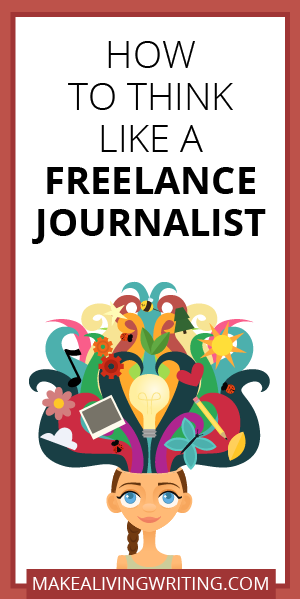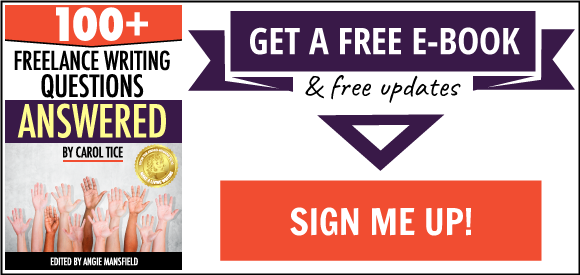
It’s a skill that will help you get better at copywriting and content writing, not just hard-news reporting.
When you learn to think like a freelance journalist, you’ll also tap into skills to ask good questions, find fresh angles and ideas, understand your audience, and ultimately make more money from writing.
Can you really learn how to think like a freelance journalist? Or do you need a J-school degree, a stint as a cub reporter, and years of experience? Yes, you can. And no, you don’t.
It might take a little practice, but you can learn to think like a freelance journalist.
To help you out, we caught up two veteran journalists in a recent Freelance Writers Den podcast to talk about journalism skills and strategies for freelance writers.
Curious? Check out this Q&A to learn how to think like a journalist:
Freelance journalist skills: Learn from the pros
Whether you’re writing magazine articles, blog posts, or content for big corporate websites, being able to think like a journalist will help you tell compelling stories that keep your clients and readers coming back for more, says Allen Taylor and Emily Leidel.
- Taylor is an award-winning journalist who focuses on writing and content marketing in the financial technology (fintech) niche.
- Leidel is a B2B copywriter, world traveler, and graduate of two journalism schools (Columbia University in New York and Sciences Po in Paris)
Q: What does it mean to think like a journalist?
A: Taylor: It’s being curious enough to look beyond what is obvious and come up with deep, thought-provoking questions that get to the heart of a story.
A journalistic mindset makes you a better writer. You get into the habit of looking for the nonobvious things. Anyone else looking at the situation would say, “Okay, here’s the story.” If you get past that, into something other people don’t see, you can flesh out the main story more deeply.
Q: What are the top journalism skills all writers should learn?
A: Leidel: First: Ask who the story is about. For example, if you’re writing about flood insurance, don’t begin with, “59,000 people don’t have flood insurance.” Instead, write, “John and Sue live in a three-bedroom ranch house. They don’t have flood insurance. And now, they got flooded.” Then give statistics. But you want a character or two that anchors the story.
Second: Answer the question “Why now?” Businesses want a press-release hook that’s more than a product release announcement. “Hey, we released a product–AND it’s related to this other event.” Same with a blog post. It needs to be timely.
Third: Focus on the details. Details are important for storytelling and building characters. For the flood insurance story, mention that these characters have beige carpet. The water level got to 2 feet and 4 inches. You can see the mark on the yellow walls in their house. All these details transport readers into the story and help them visualize it.
Q: How do you come up with the best story angle?
A: Taylor: Before you write, brainstorm. Ask yourself, “What do I know about this topic? What do I want to know?” Come up with ideas for directions this story could go.
If I do that early on-write down as many ideas as I can, and think about how this story can play out-it sparks questions. I get more curious about the topic, and that leads me into the direction I need to go.
Q: How does the journalist’s skill of coming up with story ideas translate to other forms of writing?
A: Leidel: Sometimes my copywriting clients drag their feet about what they actually want me to write. I might send them a list saying, “Hey, I think you need these pages on your website.” It’s not exactly a story idea. But it still comes from imagining what information is going to be useful to readers.
Q: How do you speak to the concerns of your audience?
A: Taylor: Put yourself in your reader’s shoes. Find out what they would want to know. And then, ask those questions.
One helpful resource is quora.com. It’s a question and answer website. You can go onto Quora and see what questions people are asking on your topic.
Q: What are your best interviewing tips?
A: Leidel: Don’t be worried about impressing the person you’re interviewing. That’s not your goal. In fact, sometimes you have to come off as kind of stupid. Your goal is to get the person to explain everything.
Ask background questions. Be quiet and listen. Ask open-ended questions. Ask, “Why?” Do that even if you think you know the answer. Don’t be afraid to ask a question that might seem obvious.
Q: How do you keep content fresh when you’re writing about the same topic a lot?
A: Taylor: Question everything. Get in the habit of coming up with questions that lead to new, interesting angles. Some ideas include:
- What’s controversial? In business it’s not always prudent to talk about the controversies. But they do get people’s attention. Just don’t take it too far.
- Who’s the underdog? That’s another story people are interested in. Who’s got everything going against them?
- What’s different or has never been done before? Who’s doing those things? Who has set a new record?
These types of questions will lead you to search and find the answers.
Q: Was there anything you learned in J-school that doesn’t apply to other types of freelance writing?
A: Leidel: I think a lot of journalists have a nonprofit mentality. “We’re doing this to help people. It’s okay to get paid pennies to write this article with a thousand rounds of edits.”
As I’ve transitioned to do more business writing, I still want to have quality. But I also have to think about how much money I’m making and not agonize about whether every sentence is absolutely the best it can be.
Q: How important is tenacity to the journalistic mindset?
A: Taylor: You have to hang in there when you’re hitting a wall, and it happens to the best of us. You’re chasing down a trail of information, and you realize, “This is a dead end.” Now you’ve got to go back-brainstorm, research, look over your notes. I’ve often found holes of information I hadn’t noticed before. And that will spark more questions.
Be dogged in chasing down every trail of information that you can find, and don’t give up.
Develop skills to think like a journalist
Maybe you didn’t go to J-school or work at a newspaper. So what? You can still develop the skills to think like a journalist. Be curious. Ask lots of questions. Connect the dots. Follow up. And you’ll be able to use those skills to move up and earn more.
What journalism skills have helped you as a freelance writer? Let’s discuss on Facebook and LinkedIn
Maria Veres is a freelance writer based in the Oklahoma City area. She contributes regular Q&A blog posts to Make A Living Writing.










